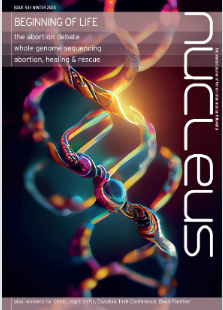The judgment was supposedly a 'win' for pro-lifers — but where was my joy as a Christian? A short article cannot do justice in comprehensively dissecting an issue that entire books have been devoted to, but this piece simply tries to shed some light on some of the lesser discussed arguments within the abortion debate, and potential reasons why this issue is so incredibly complex.
classic arguments
The pro-life versus pro-choice dichotomy is often not represented well in culture or media. Extreme advocates of both positions get portrayed, despite being unrepresentative of the majority in those positions. Both sides have strong arguments — but these mostly make sense only in the context of core beliefs held by their advocates. Failure to recognise those core beliefs only leads to futile conversation.Socioeconomic concerns in providing for a child are the most commonly cited reasons for abortion. [2],[3] Known fetal abnormality is another classic argument, and closely related is the worry of being unable to provide a good upbringing for the child. More recently, bodily autonomy, as well as sexual and economic liberty and equality, are being increasingly advocated for — the overarching causes that pro-choicers champion; the right to choose. What I consider to be the strongest pro-choice arguments are those around the reason for the abortion itself (specifically, cases of coerced pregnancy, or where the mother's life may be at risk if the pregnancy continues), and the safety of abortion services when none are legally sanctioned.
Pregnancies following rape or incest are an incredibly sensitive topic. Attitudes to resultant pregnancies vary tremendously between individual survivors — from those who suffer from abortion regret, to those who are glad they kept the child, or for whom abortion was a great relief. We should note that these comprise a small minority of abortion cases. [4] Each victim should be cared for on a case-by-case basis — uniquely, holistically, and with utmost compassion. Two wrongs don't make a right, and abortion is a second act of violence against the mother and her child conceived in rape. Ultimately, for the pro-lifer, the core issue remains clear — does rape justify the killing of the child in the womb?
the argument for life
The core of all arguments on either side can be drilled down to beliefs that root individuals to their own position: those around life and choice — or more specifically, the extent of the autonomy and right to life of mother and fetus.When does life begins to have value? Sonography now allows the high-resolution 4D visualisation of fetal movements, including facial expressions. Prenatal surgery is now a reality, indicated for conditions such as neural tube defects and congenital heart disease. The point of fetal viability outside the womb has progressively decreased over the decades, with one surviving baby reportedly being born at 21+1 weeks gestation, defying a sub-one per cent chance of survival. [5] The evidence presented by modern technology is irrefutable — to be pro-science is to believe in the undeniable humanity within the womb. [6]
However, if you believe otherwise (or that such life is less valuable in any way), even the most well-considered arguments will be meaningless to you. At the core of every case, the moral argument for life is where the two sides fundamentally diverge. In Paulsen's piece in the Public Discourse, titled The One and Only Pro-Life Argument, he stated:
The focus of pro-life advocacy should always be on the fact that the unborn child is a human being, with a moral status equal to a born child, and not on distractions about social policy, sexual ethics, or other rights claims that overlook this biological reality…If taking the life of the living, unborn human fetus amounts to the same thing as taking the life of a living, born human child, then all or nearly all the 'good' reasons for such killing, and all the 'bad' reasons for banning such killing, tend to wash away. [7]
Is the 22-week-old fetus sustained in their mother's womb worth less than its 22-week-old born counterpart who is just as dependent on artificial supports to survive? Don't new-born babies also require a 'burdensome' level of care and are not fully developed in a way similar to a fetus in the womb? Yet, passage through the birth canal seems to confer personhood unquestionably in many eyes; almost no-one would support post-birth infanticide in the modern world, regardless of how much of a 'burden', how vulnerable and voiceless, or how early in their development this born child may be.
Others may describe depriving a mother of an abortion as 'killing the mother' — saving the baby's life at the expense of the mother's physical and psychological health, potential future prospects, and social standing. However, surely autonomy must have limits when another life will be harmed, weighed on the basis of the costs to both parties. The only argument that will sensibly stand to the argument of the inviolable right to life — a moral stance held by many across race, religion (or non-religion), and occupation — is when another life is at stake.
the feminist argument
With every pregnancy and birth come inevitable difficulties, such as the stresses and sacrifices of parenthood, and the reality for some of abandonment by family and friends. Rather than pointing to abortion as the solution, such situations should galvanise society to consider ways to support the pregnant mother and to educate the public on misconceptions that fuel the vicious cycle of shame, stigma, and fear associated with pregnancy.In her landmark speech, The Feminist Case Against Abortion: the Pro-Life Roots of the Women's Movement, Serrin Foster (president of Feminists for Life of America) states that: abortion betrays the basic feminist principles of nonviolence, nondiscrimination and justice for all. Abortion is a reflection that we have not met the needs of women — and that women have settled for less. [8]
In The Progressive Roots of the Pro-Life Movement, New Yorker staff writer Emma Green summarises some interesting points covered in Daniel K. Williams' book Defenders of the Unborn: the Pro-Life Movement Before Roe v. Wade. [9] Although the pro-choice movement may seem outwardly feminist, the pro-abortion and birth-control movements actually stem from a dark, race-based and misogynistic history grounded in the control of 'poor, sexually promiscuous, or mentally disabled women — especially those who were African American'. The pro-life movement was, in fact, rooted in female empowerment and not oppression.
The Brief of 240 women scholars and professionals, and prolife feminist organisations presented to the US Supreme Court echoes the stance held firmly by the prominent early feminists — and in support of the petitioner (Dobbs), it states:Data regarding women's participation in the labour market and entrepreneurial activities, …their educational accomplishments, professional engagement, and political participation, reveals virtually no consistent correlation with abortion rates or ratios…
[The] imprimatur on a male normative experience of reproduction as the model for economic and social participation has retarded meaningful accommodation of pregnancy and motherhood in the workplace and other spheres of society…[and] failed to recognise the possible damage that the unrestricted availability of abortion could visit upon authentic progress toward sexual equality in light of 'inherent difference[s] between men and women'. [10]
Reducing the solution for the discrimination around pregnancy to abortion is an injustice to women worldwide. It provides no real fix and actively shifts the focus away from the injustices of deep-seated stigma, discrimination, and inequality perpetuated in families, communities, and workplaces that cause women to even consider abortion in the first place.
law and the ethical slippery slope
What is the role of the law? One argument for legal abortion is as a means to improve safety and reduce rates of illegal back street abortions, an issue that disproportionately affects women of lower socioeconomic statuses. However, a thorough exploration would also have to consider complications from legal abortion; it may be hard to quantify these as they are potentially more influenced by gestational age, and reporting laws on abortion do not always cover complications and/or death. [11], [12], [13]Additionally, the law can also affect attitudes. The slippery slope argument proposes that the legal acceptance of a small action could potentially lead to the acceptance of other small actions that ultimately culminate as an undesirable action that the law initially deems unacceptable. This has been illustrated by recent experience in Ireland. Abortion rates rose dramatically in the years after the 2018 referendum that legalised abortion up to the twelfth week of pregnancy. This rose from a reported 32 abortions in Ireland [14] and 2,859 Irish residents obtaining abortions in England/Wales in 2019, [15] to 6,666 in 2019 and 6,577 in 2020 locally, not including overseas abortions. [16]
The complex and intimate nature of pregnancy can make the involvement of law seem like an invasion of privacy. However, for similar reasons to why theft and violence should be an issue in which law has a say, the autonomy of a mother should be primary only in so far as it does not endanger the life and wellbeing of the child she is carrying. This is the moral view for the right to life and against life-ending violence that even secular pro-life activists hold. Not all pro-life advocates would agree that criminalisation is the answer — particularly in nuanced situations like pregnancy arising from rape.
closing thoughts
I understand that taking this stance may cause many to label me as crazy, regressive, antiquated, unempathetic, legalistic, moralistic, extremist, bigoted — but where Christ has led me, through ways including my conscience, is where I will stand until he has revealed to me otherwise. In the meantime, as I continue to wrestle through each ethical dilemma, I simply strive to approach every unique case with utmost love and compassion, which Christ himself modelled throughout his life on Earth.Indeed, only when we carefully listen to the views of those on the other side can we see that there is often unexpected beauty, valid reasoning, tremendous pain, and conflicting dilemmas behind them. It is often ignorance that fuels self-righteousness, hostility, and intolerance. It is crucial that we never stop questioning the reasons for our beliefs and the beliefs that those on the other side hold, and to put aside assumptions and simply listen. This is the stance I hope I have taken in my attempt to better understand both sides on an issue that I want to better prepare myself to face, with greater knowledge and compassion, while remaining true to my faith and convictions.
The abortion debate has proven to be a much bigger slice of cake than I had originally envisioned, layered with nuances and complexities perhaps unrivalled by that of any other ethical issue. Yet, incredible medical, personal, statistical, societal, and historical evidence continues to form a compelling case for the moral view of the humanity of the unborn child and their right to life is upheld by people regardless of race, beliefs, religion, sexual orientation, and even dietary habits! [17] Ultimately, compassion over condemnation should be the status quo. Greater pressure should be placed on governing bodies and communities to work towards a world where women do not ever have to consider the horror that is an abortion.
































